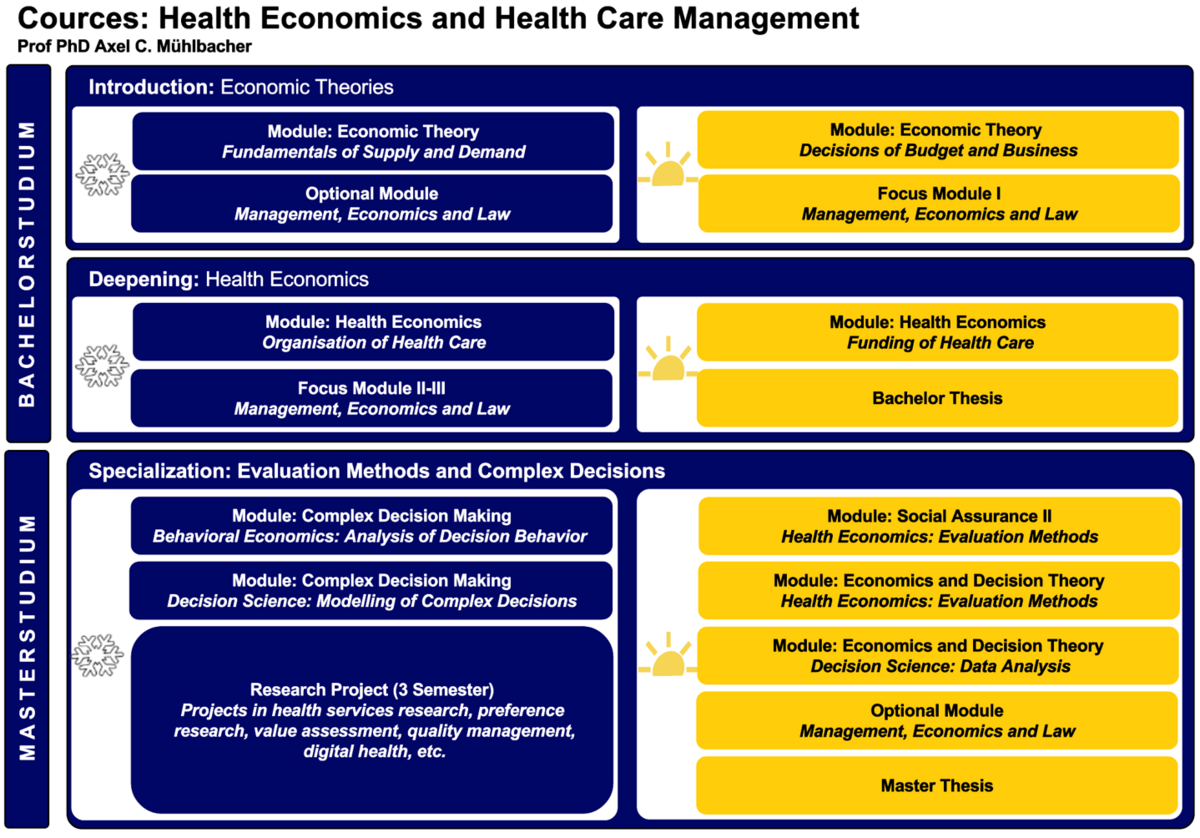
Courses - Overview
In the healthcare system, every tenth person in the workforce is employed. Additionally, the revenue volume amounts to 400 billion euros, which is why the healthcare system holds a central position in terms of economic and societal importance. Since the healthcare system is funded through public resources, effectiveness and efficiency are of paramount importance. It is essential that future decision-makers receive a solid education to tackle the multifaceted and complex challenges of the healthcare system. The objective of the Professorship of Health Economics and Medical Management is to equip students with essential competencies to achieve this effectiveness and efficiency with their decisions.
The structure of the curriculum is divided into three main levels:
1. Introduction: Economic Theory
Module: Economic Theory
Lecture 1: Fundamentals of Supply and Demand
This Lecture unlocks the understanding of basic market mechanisms, a fundamental building block for analyzing healthcare economic issues.
Lecture 2: Decisions of Budget and Buisness
It explains decision-making in economic contexts, essential for understanding decision behavior in healthcare.
Elective Module: Management, Economics, and Law
Optional choice between various modules in the field of management, economics, and law, including Economic Theory: Analysis of Decision Behavior.
Focus Module I
Optional choice in the focus area of economics, management, and law, offering various focuses on economic theory and healthcare economics.
2. Deepening: Health Economics
Module: Health Economics
Lecture 1: Organization of Health Care
Explores the structure and function of the healthcare system, crucial for designing efficient healthcare structures.
Lecture 2: Financing of Health Care
Deepens understanding of financing mechanisms, essential for sustainable healthcare system development.
Focus Modules II-III
Optional choice in the focus area of economics, management, and law, offering various focuses on economic theory and healthcare economics.
Bachelor's Thesis
Support in developing a problem statement, research questions, suitable methodology, and results.
3. Specialization: Evaluation Methods and Complex Decisions
Module: Complex Decision Making
Lecture 1: Behavioral Economics - Analysis of Decision Behavior
Analyzes behavioral patterns in economic contexts, of central importance for the development of intervention strategies.
Lecture 2: Decision Science - Modeling of Complex Decisions
Discusses modeling and analysis of complex decisions, a key tool for healthcare management.
Module: Economics & Decision Theory
Lecture 1: Decision Science - Data Analysis
Provides solid knowledge in data analysis, enabling informed, data-driven decisions.
Lecture 2: Health Economics - Evaluation Methods
Conveys methods for evaluating healthcare interventions, highly relevant for evidence-based and responsible policy-making.
Module: Social Assurance II
Lecture: Health Economics - Evaluation Methods
Conveys methods for evaluating healthcare interventions, highly relevant for evidence-based and responsible policy-making.
Optional Module: Management, Economics, and Law
Optional choice between various modules in the field of management, economics, and law, including Decision Science: Data Collection; Decision Science: Decision-Making.
Research Project (3 Semesters)
Development, realization, interpretation of a self-selected research project, including projects in healthcare research, preference research, value assessment, quality management, digital health.
Master Thesis
Support during the execution of the Master's thesis includes assistance in developing a clear problem statement, formulating precise research questions, and selecting and applying appropriate methods for data collection and analysis. Furthermore, guidance will be provided in deriving, interpreting, and presenting the research results.
In detail, the following support is offered:
- Development of the Problem Statement: Together, we will identify and clearly define a specific, relevant, and researchable problem statement. This will take into account not only the relevance of the topic to the field but also its significance and applicability in practice.
- Formulation of Research Questions: Based on the problem statement, precise research questions will be developed. These will serve as a guideline for the entire research work and help maintain focus during the research process.
- Selection of Appropriate Methods: Depending on the research questions and the chosen problem statement, support will be provided in selecting the most suitable research methods. This ensures that the selected methods meet scientific standards and are practically implementable.
- Derivation of Results: Assistance will be provided in the systematic collection, evaluation, and interpretation of data. Together, we will ensure that the research results are valid, reliable, and significant to draw well-founded conclusions and make recommendations.
This comprehensive support aims to ensure the quality of your Master's thesis and impart the necessary scientific expertise and methodological competence for the successful completion of your research project.
Under the guiding principle of "Innovations for an effective and efficient healthcare system," the courses focus on providing a practical and scientifically grounded education for future decision-makers in healthcare.
Healthcare offers a wide range of fields of activity. The connection between theoretical concepts and practical issues ensures that participants are equipped with the skills needed to navigate in such a complex environment.
Our graduates are the future shapers of our healthcare system. We hope this is done in a way that meets the individual needs of patients and their families, as well as the societal requirements for sustainability and efficiency.
In a time when healthcare sector spending is in focus, decision-makers must be able to develop innovative and efficient solutions for the needs of vulnerable groups.
Therefore, the education aims not only to provide students with the required technical knowledge but also to instill a deep understanding of the economic, social, and political dimensions of healthcare. The ability to make informed decisions is based on careful training. It is the combination of expertise and responsibility that makes graduates valuable intermediaries between medical care, economic viability, and societal responsibility, and thus key figures in shaping a healthcare system that meets the demands of the 21st century.